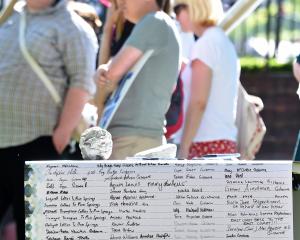
For the past year, Medicus has gone head-to-head with the Medical Protection Society (MPS), which has the lion's share of the market. Both are not-for-profit schemes.
DHBs fork out millions of dollars a year to MPS in subscription fees, something Medicus wants to tap.
Dr Cunningham, an Otago Medical School senior lecturer and Milton GP, is part of a group of New Zealand doctors who established Medicus.
The group wanted a wholly New Zealand service with New Zealand governance, he said.
He believed his scheme presented better value.
Medicus' fully trained-doctor fee is $1042 compared with MPS' $1374, although for some clinical roles MPS fees are substantially less.
Dr Cunningham declined to say how many doctors had joined, but the group always expected a challenge.
He hoped the new year brought more members, because that was when many subscriptions were up for renewal.
Demand would likely be strong from general practice, where cost was a consideration.
He believed DHBs had a "moral imperative" to buy services as cheaply as possible, to save taxpayer money. DHBs allow clinicians to choose a provider, and pay accordingly.
Health Benefits Ltd, which the Government established in 2010 to cut administrative and procurement costs, is ensuring DHBs buy regular insurance in bulk, communication and engagements manager Mark Reynolds said.
"We are aware that DHBs also have costs associated with policies they directly or indirectly fund related to personal negligence for groups like senior medical officers and resident doctors.
"At the moment this is not on the scope of our insurance work, as there are agreements DHBs have with their staff on these.
"However, we would welcome the opportunity to look at it and provide recommendations to DHBs."
MPS corporate services manager Rebecca Imrie said very few MPS members had left. She said in many clinical roles MPS was cheaper.
MPS fees had dropped, over the past two years, by about 9% each year. This was not due to Medicus entering the market, it was because costs were lower than had been expected.
Ian Powell, executive director of the senior doctors' union, was unenthusiastic about the "extremely new" Medicus.
MPS was well established, with a good track record.
He urged doctors to switch only if they were sure the quality of legal representation would be similar.
He was wary of DHBs herding doctors towards a provider, as it could nurture a cosy relationship between DHBs and the insurer.
Doctors' and DHBs' interests were not always the same, he said.
He acknowledged his organisation, the Association of Salaried Medical Specialists, had ties with MPS, but they did not constitute a binding relationship.












